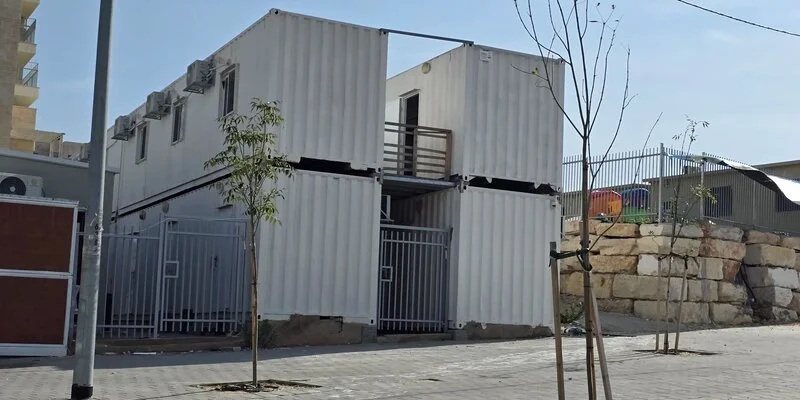Jerusalem’s Garbage Dump: Petition Filed to Close Sewage Plant at Atarot
Six months ago, Shomrim revealed that the police’s Occupational Health Unit found that the severe air pollution at the Atarot industrial zone was endangering the health of officers serving nearby. Now, following a petition filed by the owner of an adjacent shopping mall seeking the closure of a sewage treatment plant, it turns out that a senior official from Jerusalem Municipality described the whole area as “a garbage dump” and that the Ministry of Environmental Protection has already sought to rescind the plant’s operating license – before changing its mind. The company’s response: We were there first. A Shomrim follow-up
.jpg)
.jpg)
Six months ago, Shomrim revealed that the police’s Occupational Health Unit found that the severe air pollution at the Atarot industrial zone was endangering the health of officers serving nearby. Now, following a petition filed by the owner of an adjacent shopping mall seeking the closure of a sewage treatment plant, it turns out that a senior official from Jerusalem Municipality described the whole area as “a garbage dump” and that the Ministry of Environmental Protection has already sought to rescind the plant’s operating license – before changing its mind. The company’s response: We were there first. A Shomrim follow-up
.jpg)
Six months ago, Shomrim revealed that the police’s Occupational Health Unit found that the severe air pollution at the Atarot industrial zone was endangering the health of officers serving nearby. Now, following a petition filed by the owner of an adjacent shopping mall seeking the closure of a sewage treatment plant, it turns out that a senior official from Jerusalem Municipality described the whole area as “a garbage dump” and that the Ministry of Environmental Protection has already sought to rescind the plant’s operating license – before changing its mind. The company’s response: We were there first. A Shomrim follow-up
Atarot industrial zone. Photo: David Vinocur

Uri Blau
November 3, 2022
Summary


Listen to a Dynamic Summary of the Article
Created using NotebookLM AI tool
The Atarot industrial zone, to the north of Jerusalem, is a well-known source of air pollution and severe environmental odor complaints. In May 2022, a Shomrim investigation, also published on the Ynet website, revealed that an internal opinion formulated by the Israel Police’s Occupational Health and Safety Unit found that serving at the Atarot Border Police base is dangerous to the health due to severe air pollution. According to Greenpeace Israel, annual air pollution at the site exceeded the legal limit by an average of 288 percent. In some years, the pollution level was 1,000 percent above the legal limit. The head of the police’s Occupational Health and Safety Unit, Chief Superintendent Dr. Valerie Shoshan, said that “this level of pollution endangers the health of the soldiers” and recommended that “the base be evacuated and relocated from its present location.”
The Shomrim report is now cited in a petition filed in September by Rami Levy Hashikma Marketing, which owns the Atarot shopping mall, in which the company claims that Israeli authorities have failed to deal with the environmental hazards there. The petition – which was filed against the Jerusalem Municipality, the Ministry of Environmental Protection, and Pa’il Sewage Services, a company operating in the industrial zone – is asking the court to order the authorities to take action against the party responsible, according to the Ministry of Environmental Protection, for the hazards.
According to the petition and additional material, it has become apparent that authorities have been negotiating with Pa’il for many years and that representatives of the company have been called for hearings by the Jerusalem Municipality and the Ministry of Environmental Protection. Pa’il was given a strict set of criteria by which it would be allowed to continue operating, but despite allegedly not having met these criteria, it continues to operate. Moreover, in May 2022, Osnat Lask, who oversees air quality at the Ministry of Environmental Protection, announced that she was recommending not renewing the temporary license issued to the plant. Three months later, however, the ministry changed its mind and informed Jerusalem Municipality that it was extending Pa’il’s license by an additional year.

Abed Hafez Jubeh, who owns an electrical goods store in the Atarot industrial zone, lives in Beit Hanina, just a few hundred yards from the plant. “We’re suffering terribly. It smells like poison,” he says, explaining how the hazard impacts his family’s daily life. “We have a balcony and I can never sit out there, have a barbeque, or anything.” He says that he has complained thirty or forty times to City Hall and the Ministry of Environmental Protection, but nothing has been done

Dror Argaman, the owner of the plant: "It is unfortunate that such a vital plant for the environment, and for the city of Jerusalem in particular, which is recognized by the water authority as an authorities plant for handling waste material, is being attacked by people with commercial interests, who opted to build their businesses in an industrial zone, adjacent to a plant that was opened many years previously, even though they knew about the existence of the plant close to the location they chose to build a shopping mall"
“They Say They’re Dealing with It – But They’re Not”
Among its other activities, Pa’il Sewage Services separates oils to be used in biodiesel production. According to the petition, this activity creates “strong smells, with acidic characteristics and an odor of sewage and waste, which are unbearable and can cause a sense of choking and suffocation.” As a result of these hazards, the quality of life and the environment in the area has been adversely affected, especially for the tens of thousands of Arab residents of Beit Hanina, Kafr Aqab and A-Ram. The video documentation obtained by Shomrim can be viewed here.
Abed Hafez Jubeh, who owns an electrical goods store in the Atarot industrial zone, lives in Beit Hanina, just a few hundred yards from the plant. “We’re suffering terribly. It smells like poison,” he says, explaining how the hazard impacts his family’s daily life. “We have a balcony and I can never sit out there, have a barbeque, or anything.” He says that he has complained thirty or forty times to City Hall and the Ministry of Environmental Protection, but nothing has been done. “Every time I complain, they say that they are dealing with it – but they’re not… I ask them to send someone to look, to experience the smell from the plant… I’ve thought many times about just leaving this place.”
Most of the residents of the area, as well as most of the workers in the industrial zone, are Arabs. Jubeh has no doubt that this plays a role in how the authorities handle the issue. “If this was a Jewish-Israeli place, the problem would be dealt with within a month.”
According to the attorney representing Rami Levy Hashikma Marketing, the damage is extreme. It has led to “people leasing units in the mall, who have invested huge sums of money… to flee from the mall because of the extremely unpleasant odor.” According to the company, the problem is with Jerusalem Municipality and the Ministry of Environmental Protection - the gatekeepers failing to address the issue.
It now turns out that Jerusalem Municipality held a hearing for the company over the foul smells coming from its plant as far back as 2019. During that hearing – to which the company did not bother sending a representative – Nimrod Levy, the director of the municipality’s Environmental Engineering Department, explained that the plant handles the city’s oil waste and plays a vital role. According to Levy, the plant has operated for years in the Atarot industrial zone, which he described as “Jerusalem’s garbage dump,” and confirmed that complaints had been received from Beit Hanina residents and the Atarot shopping mall.
At that hearing three years ago, Levy added that the plant “was about to do roofing work on its entire area, including the area where trucks enter and unload their cargo, which stinks of sewage… and when that happens, I believe it will improve the problem of foul odors.” At the same hearing, it was also mentioned that the company had previously been summoned to a hearing at the Ministry of Environmental Protection, where it was ordered to fulfill the ministry’s conditions within 14 days. If it did not meet these criteria, the company would have its temporary license rescinded. Nonetheless, the plant continued to operate as usual.
Three years later, in February 2022, the company was once again summoned for a hearing at Jerusalem Municipality. At that hearing, it became evident that very little had been done since then if anything. Once again, the roofing issue was raised and it seemed that the only progress was that the company had submitted plans for partial roofing. However, even these drafts did not meet the ministry’s demands. “This does not meet the demands issued at the previous hearing and is not acceptable,” Lask wrote. “The company must present a plan for roofing and for dealing with air pollution, including dates for completion, as stipulated in the summary of the hearing… In light of this and the company’s foot-dragging regarding the roofing project… we recommend not renewing the plant’s temporary license.”
Two months ago, as mentioned above, and apparently without any change on the ground, the Ministry of Environmental Protection announced that it was extending the temporary operating license granted to the plant for an additional year. Asked why it did so, the ministry responded, “following enforcement measures that the Ministry of Environmental Protection and Jerusalem Municipality conducted against Pa’il Sewage Services, the plant submitted details of how it plans to prevent environmental hazards as a result of its activities.”
In response to this, Rami Levy Hashikma Marketing submitted a petition to the Jerusalem District Court, asking it to instruct the Ministry of Environmental Protection and Jerusalem Municipality to order the immediate cessation of operations at the plant. According to the petition, the damage being done to the environment “is continuing on account of the abnormal and blatant disregard of the Jerusalem Municipality, as well as the Ministry of Environmental Protection.”
The plant’s response: We have a significant upgrade plan
The Jerusalem Municipality submitted the following response to Shomrim: “The issue is being handled at the level of enforcement by Jerusalem Municipality, in cooperation with the Ministry of Environmental Protection, vis-à-vis the plant that is operating without the requisite license. The municipality will respond to all the claims made in the petition to the courts in the usual manner. Jerusalem Municipality will work to stamp out any hazard at the site and will take every measure necessary to accomplish this.”
The Ministry of Environmental Protection said in response that it would “continue to try and prevent pollution from the plant with all the tools at its disposal. A response to the rest of the claims made in the petition will be given as part of the ministry’s response to the court, as is accepted practice.”
Dror Argaman, the owner of the plant, said in response to a question submitted by Shomrim that “the Pa’il sewage plant was established in 2009 and it is a vital plant for safeguarding the quality of the environment around Jerusalem and in Israel. The plant dismantles and disposes of waste material and separates them into elements that do not harm the environment. It does so on a large scale, and its contribution to maintaining the environment and improving quality of life is not being questioned. Ever since it was established, the plant has been in constant contact with the relevant authorities, followed their instructions and constantly worked to improve and streamline the processes at the plant. The plant employs the finest experts in the field of environmental studies, engineering and consultancy to improve the plant's various operational aspects, including safeguarding clean air and a clean and green environment.”
According to Argaman, “the plant is currently undergoing a major overhaul, including erecting a roof over the entire area of the plant and extracting air emissions from the plant for a rigorous filtering process using the most advanced technology in the world, which has proved itself in various places in the world and which has been approved by the relevant regulatory authorities as a suitable solution. This overhaul is being carried out with utmost efficiency and at the expense of Pa’il.”
He added that “it is unfortunate that such a vital plant for the environment, and for the city of Jerusalem in particular, which is recognized by the water authority as an authorities plant for handling waste material, is being attacked by people with commercial interests, who opted to build their businesses in an industrial zone, adjacent to a plant that was opened many years previously, even though they knew about the existence of the plant close to the location they chose to build a shopping mall.
“It also bears stating that the Atarot industrial zone is also home to additional plants and factories which frequently create significant odor hazards and that, on several occasions, our plant has been blamed for odors that came from other sources. Our response to the petition filed to the Jerusalem District Court will be given using the proper and proportional legal tools, and Pa’il Sewage Services will not conduct a legal case in the media. The Pa’il sewage plant will continue to improve the environment by dismantling and disposing of waste material while observing the rules of fair competition and reducing the cost to its customers – a saving that, in the end, finds its way to residents of Jerusalem and the surrounding areas.”













